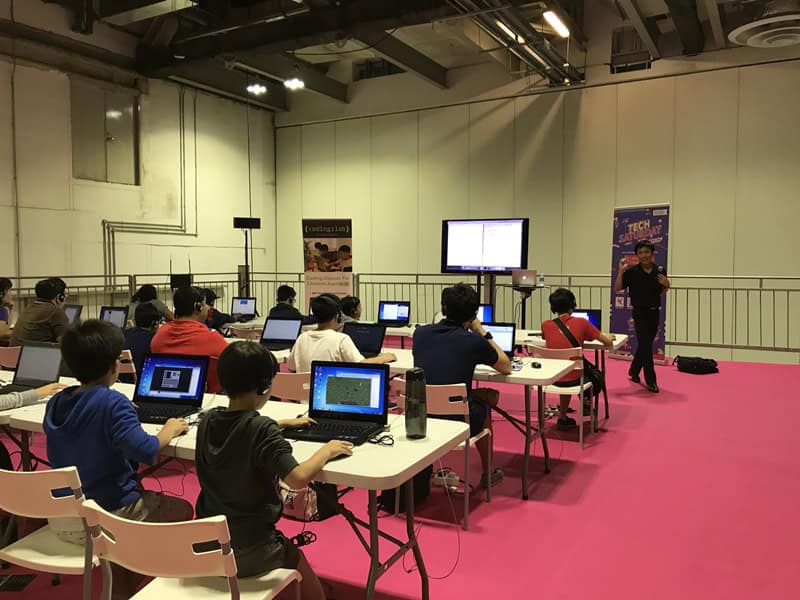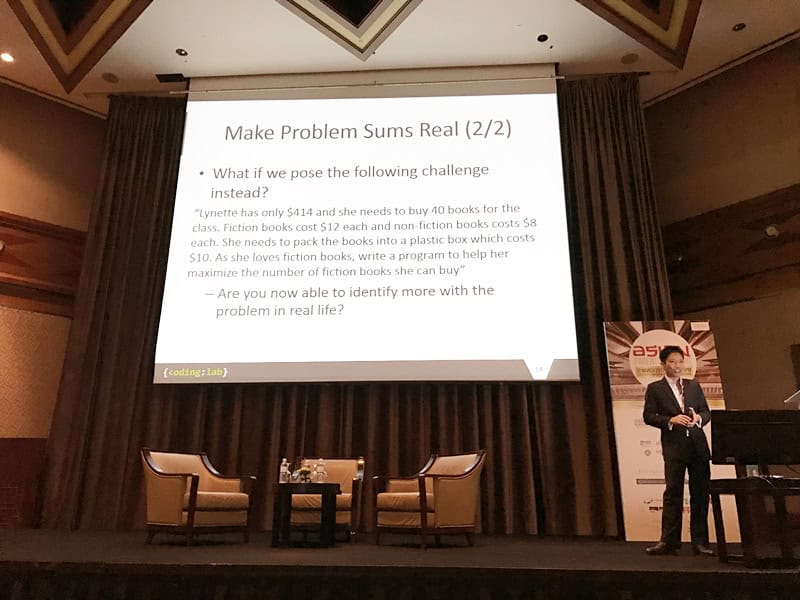Our Parenting World Interview Series: Coding Lab and Exclusive Interview with Yong Ning Foo, Founder of Coding Lab
Nurturing future leaders in Technology!
Coding Lab is the winner of Best Coding Curriculum, as voted by Parents (Parents World – 2016/17). It is founded by an MIT Alumnus who has worked in Silicon Valley, the company’s Award-Winning curriculum challenges children to develop computational thinking and creativity of expression, with a strong emphasis on inquiry-based learning and the application of key mathematical concepts. Coding Lab offers programming classes for ages 4-16 in Japan, Perth and Singapore.
To find out more, please check out the following:
Website: www.codinglab.com.sg
Tel: +65 6528 2282
Facebook: https://www.facebook.com/CodingLabAsia/
Our Parenting World (OPW) team is pleased to be able to interview Yong Ning Foo (YNF), Founder of Coding Lab where he will share with us more about Coding Lab.

1) Share with us what influenced and inspired you to start Coding Lab.
YNF: I first started coding in University and really enjoyed it right up till I completed my Masters in Computational Design at the Massachusetts Institute of Technology (MIT).
As a father of two, I knew that technology was going to play a huge part in my kids’ lives. That got me thinking about introducing my favourite subject to them, in a fun way, to help them gain a better understanding of the games they play and the design behind their favourite toys.
At the same time, I ran into difficulties at work, coaching a few members of my team on how they could automate some of the analytical work they were doing. I realised that if the team had known the fundamental concepts of coding, they would have been far better off.
One morning on my way to work, I saw the video “Let’s teach kids to code” by Mitchel Resnick of MIT Media Lab. That was the eye opener for me. That’s when the seed got planted in my mind to encourage children to learn coding, and I started working on Coding Lab.
Today, we are present in 3 countries, Japan, Perth and Singapore, with the mission of empowering our young to become tomorrows’ creators of technology.
2) What is Coding, and how would learning to code be beneficial to a child, academically?
YNF: Coding is simply giving instructions to a computer to make it do what we want. When we teach children how to code, we are teaching them computational thinking – a skill that is valid for life.
Computational thinking, highly-regarded as the must-have 21st century skill in this digital age, empowers you to tackle problems by breaking them down into smaller parts (decomposition), and then arrive at a solution which can be easily and accurately executed by a computer (or another human). It is critical that children learn this powerful strategy in life.
Learning computational thinking early helps your child at school to think logically and builds their confidence in problem-solving. In learning to give the computer precise instructions, they understand the importance of structuring their answers for their comprehension. By understanding how to create games that have levels, timers, and learning to shoot projectiles, they apply mathematical concepts such as angles, arithmetic and fractions intensively. This allows them to practice what they had learnt in school, strengthening their foundation in Math.
We have also often heard about Coding being the new literacy. Today, it is virtually impossible for one to go through a single day without encountering technology built based on Computational Thinking. For example, we use Computational Thinking to expedite the sequencing of the human genome in Biology, analyse fMRI images in Medicine, perform weather forecasting in geology, perform aerodynamics tests of aircrafts with computer simulation in Aeronautics and perform quantitative trading in Finance. The possibilities are endless.

All the above images credited to Coding Lab
3) At what age do you think children should start learning to code?
YNF: Our programmes start kids on coding at an age that they are ready for learning independently – 4 years old. Children from the age of 4 can listen to instructions and carry out tasks sequentially and independently. Being still impulsive and impatient, the 1st step as a coding educator is to harness their awakening comprehension of the world around them, and guide them to give specific instructions to achieve a desired outcome.
For example, a pre-schooler would tell us that they see something ahead. When asked where the item is, they would say: ”There!” and get frustrated when we fail to understand what they are pointing at. In our coding programme, instead of saying that I want the cartoon cat to do “that”, they are taught to say “I want the cartoon cat to first move 10 steps to the right, jump to the height of 5 units 2 times and finally make the sound meow”.
This trains their logical thinking capabilities and builds up their foundation in Mathematics before they enter Primary School.
4) Tell us more about your experience at MIT and how that shapes the teaching style at Coding Lab?
YNF: My experience at MIT was life-changing. The curriculum was extremely rigorous, highly challenging and heavily grounded in Mathematics. Mathematics was applied to all fields, eg. Finance, Economics or Management Science.
The environment and excitement of being so close to the forefront of technology and that of being surrounded by many classmates who were all also top students from around the world, was truly humbling and really challenged me to measure up to a very high level of performance.
I would say that my experience there has had a profound effect on how I teach, in a sense that I believe in inquiry-based learning, where students are not always given the “correct answers” but are encouraged to try and test their hypotheses to arrive at their own conclusion. At the same time, the coding curriculum at Coding Lab heavily emphasizes on Mathematics, and topics at our weekly classes cover many relevant fields that the students encounter at school, applying programming to subjects such as Biology, Chemistry and Physics, (inspired by my time at MIT), on top of the usual hardware add-ons and robotics.
5) What advice would you give to parents who want to start their child on coding? Do you have any tips for parents when choosing a school?
YNF: A common question that I get is that parents wonder which programming language their child should start with, given that there are many different languages out there. They also want their child to learn as many languages as they can. My advice would be to introduce an age-appropriate language to your child, let him/her build up a strong foundation in it, and then move on and let him explore other languages. When learning programming, it is not about the current language ‘a-la-mode’ as the trend changes with time. Most importantly, the child must gain a critical understanding of computational thinking, which is applicable across all domains regardless of the programming language.
When selecting a coding school, parents should consider the following 3 factors:
- Coding Curriculum –What are the credentials of the curriculum team? Does your child start on a programming language that is suitable for his age? Does the curriculum challenge the faster students but at the same time allow sufficient practice for the rest of the students? A well-designed curriculum should also give your child the ability to pick up computational thinking.
- High-Quality Teaching –Do the teachers have appropriate qualifications? Not only technically, but also what is their experience in handling children? Are they patient and passionate and love children? Having a good teacher can make all the difference in engaging your child the right way, and set the tone for their journey in technology.
- Environment – Does the space have lighting that is specially designed for computer work in mind? Are there windows for the students to look far out, to rest their eyes in between their work (We advocate an eye-break every half an hour)? Are there Tinker Zones for kids to play with in between classes to further their learning independently, at no extra cost?
6) How can parents help at home, in supporting their child’s interest in programming and STEM (Science, Technology, Engineering, Mathematics)?
YNF: Here are some tips and simple exercises you can do with your child at home:
Ages 4-6:
- Get your preschooler hide their favourite toy, then get them give you directions to lead you to the toy. Directions given must be very specific, eg. “Walk 5 steps forward” and include spatial instructions such as “Behind the Sofa”, or “Above the Table” so that this will train up their spatial awareness. This also helps build up Problem-Solving (Step-by-Step logical thinking skills).
Ages 7-12:
- Find out what their favourite game is, and then ask them to break it down into smaller parts and try to understand how the developer created the game. Eg. Clash Royale: How are the characters controlled? How are the levels programmed? Are the cards given randomised? How does the music change during the final 30 seconds?
Kids can also try their hand at creating simple games here:
Pong: https://scratch.mit.edu/projects/123636704/
Scratchemon-Go
A Pokemon-Go inspired game: https://scratch.mit.edu/projects/119831978/
Thank you Yong Ning Foo for taking our interview!
To find out more about Coding Lab and to find the best coding class for your child, please go to:
Website: www.codinglab.com.sg
Facebook: https://www.facebook.com/CodingLabAsia/





7 Comments
Thanks for this meaningful interview!
Pingback: Coding for Kids – Scratch Beginners Course by Coding Lab | Our Parenting World
I really like reading your articles. Keep up the good work!
This is a wonderful interview feature!
This is an inspiring interview!
I am looking for and I love to post a comment that “The content of your post is awesome” Great work!
Love your interview features, keep up the good work!